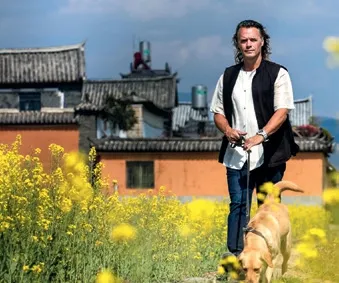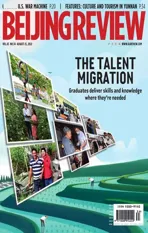A Bridge to China
2022-08-24AnAmericanoperatesaninninYunnantofacilitateunderstandingoflocalcultureByLiXiaoyang
An American operates an inn in Yunnan to facilitate understanding of local culture By Li Xiaoyang
Tourists begin arriving at the rice paddies of Xizhou Township early in the morning. The township, with beautiful natural scenery and distinctive culture of the Bai ethnic group, is a popular tourist attraction on Chinese social media platforms. Among the crowd of tourists and local residents, sometimes you may see an American with long blonde hair, known to many by his Chinese name, Mr. Lin Deng. He is Brian Linden, owner of the Linden Centre, an inn beside the paddy fields.
It has been 16 years since this man from Chicago settled down in Xizhou, located in Dali Bai Autonomous Prefecture in Yunnan Province.In 2006, he took over a local house built in the 1940s and turned it into a hotel, which has become a landmark of the town.
“The inspiration for the Linden Centre went beyond running an inn. The goal was to create a platform that would facilitate a deeper understanding of China’s cultural heritage and a business model that would have a greater economic impact on the local communities,” Linden told.
Ties with China
Several decades ago, Linden knew little about China and never thought he would come to the country. He used to be a student at a community college in Chicago and had a part-time job as a carpet cleaner. From a professor of the University of Chicago, he learned of a full-scholarship established by the Chinese Government. In 1984, he made an attempt to obtain the scholarship and was admitted to Peking University.
His ties with China began from that time.Linden then worked for U.S. news platform CBS’s Beijing bureau, during which time he interviewed then Chinese leader Deng Xiaoping. After meeting a girl named Jeannee in Nanjing, Jiangsu Province,who later became his wife, he went to Stanford University for further study in 1988. Living for adecade in different countries, Linden decided to return to China with his wife and two sons in 2004. They sold their house in the U.S. and moved to China.

Brian Linden walks his dog near the Linden Centre in Xizhou Township,Dali Bai Autonomous Prefecture of Yunnan Province, in 2019
They spent two years exploring different cities across China, finally settling down in Dali. They were attracted by a weather-beaten courtyard there,which was built by Yang Pinxiang, a famous local businessman in Xizhouin the 1940s. The building is a heritage site under national-level protection. The Lindens rented and renovated it while maintaining its original structure,with support from the local government. The hotel opened for business in 2008.

Brian Linden and his wife at the Linden Centre in 2019
The compound, known as the Linden Centre,is not merely a hotel but also a public community space in the village, where many educational and cultural activities are often hosted.
Linden has sought to integrate his hotel into the village’s social and cultural life, and create benefits for villagers. “We want the village and our neighbors to be the defining quality of any stay at the Linden Centre. In order to do this, we hired only local staff, training them for six months before opening. We created free daily tours that helped employ more villagers,” he said.
Many of their guests would join in local weddings, funerals and festivals. The village neighbors embraced these visitors as if they were extended family members. Before the COVID-19 pandemic,the hotel had created over 60 jobs in the small village. Some staff members have worked in the hotel for over a decade.
According to Linden, the hotel has now grown into a chain, with three sites in Xizhou, two sites in nearby Shaxi Township of Dali and a beautiful garden courtyard complex in Suzhou, Jiangsu Province. The three buildings in Xizhou can accommodate over 80 guests in total at one time.
From 2008 to 2011, more than 75 of the Linden Centre’s guests were from overseas. However, in the 2010s, the number of Chinese guests increased,to account for more than 60 percent in 2019.During the COVID-19 pandemic, the proportion has gone over 90 percent, he said.
Linden’s hotel carries distinctive Bai ethnic culture. Although many inns and hotels have emerged beside Erhai Lake, a famous tourist attraction in Dali, not many are built in the traditional style of the Bai people. As the tourism industry grew in China in recent years, some hotel owners rented old houses and renovated them into modern but usually undistinctive buildings, as tourists used to prefer the comfort of large modern hotels. But Linden has noticed a change in taste. “We find that Chinese visitors are now seeking a connection with the past.Many guests are now living in modern cities and seldom experience the countryside. These guests enjoy our slower pace of life, our closeness to nature, and the gracious hospitality of our locals,” he said.
A friend from afar
Linden has witnessed the changes that have occurred in China over the recent decades.According to him, several decades ago there were no paved roads or telephones in rural China. Now there are new roads, schools, hotels and hospitals in even remote villages.
After years of living in Xizhou, Linden has become quite familiar with the local people. He even earned the nickname, Village Head Lin. “As a foreigner, I benefit daily from China’s 2,500-yearold Confucian tradition—‘It is a pleasure to have friends coming from afar.’ That seed of openness and hospitality remains in the hearts of so many Chinese friends,” Linden said.
Chinese culture is full of charm for him. “I have always been impressed by the Chinese people’s balance of personal ambition and familial responsibility. In the U.S., I was an individual, often encouraged to live for myself, pursue my dreams irrespective of those around me. This sense of individualism is freeing to some, but for others it leaves them lonely and unfulfilled,” Linden said.
In his eyes, many Chinese people are socially tempered by their familial and civic responsibilities.This leads to a much less volatile social environment and much more civic solidarity. There is a harmony to China’s society that he seldom feels in the West, he said.
Linden hopes to provide lens for more people to observe, understand and love China. “Travel should be not solely synonymous with leisure. China’s history and culture, which are not always easily accessible in the increasingly homogenous urban environment, present endless attractions to any visitor. While the world is filled with allure, there is only one China,” he said. BR
